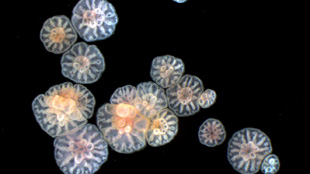 Coral polyps that developed from fragmented embryos are smaller in size. ANDREW NEGRI AND ANDREW HEYWARD, AUSTRALIAN INSTITUTE OF MARINE SCIENCE
Coral polyps that developed from fragmented embryos are smaller in size. ANDREW NEGRI AND ANDREW HEYWARD, AUSTRALIAN INSTITUTE OF MARINE SCIENCE
Coral embryos drifting in rough ocean waves are essentially naked, with no protective membrane to keep them from breaking apart in the turbulence. The individual cells fragmented from the embryo are able to develop into new coral embryos and into adulthood in the lab, smaller in size but viable, according to research published today in Science.
“It’s a good paper, establishing a new way that corals can increase their numbers asexually,” said coral reef biologist Peter Glynn from the University of Miami, who did not take part in the research. “If they can demonstrate this in nature, it would be really unique and exciting.”
Ocean scientists Andrew Negri and Andrew Heyward from the Australian Institute of Marine Science have been handling young corals for years, ...


















